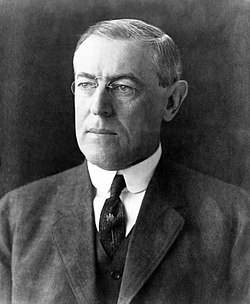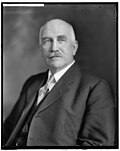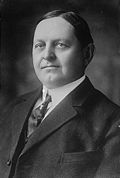| |||||||||||||||||||||||||||||||||||||||||||||||
1,088 delegates to the 1912 Democratic National Convention 726 (two-thirds) votes needed to win | |||||||||||||||||||||||||||||||||||||||||||||||
|---|---|---|---|---|---|---|---|---|---|---|---|---|---|---|---|---|---|---|---|---|---|---|---|---|---|---|---|---|---|---|---|---|---|---|---|---|---|---|---|---|---|---|---|---|---|---|---|
| |||||||||||||||||||||||||||||||||||||||||||||||
| |||||||||||||||||||||||||||||||||||||||||||||||
From March 19 to June 4, 1912, voters of the Democratic Party elected delegates to the 1912 Democratic National Convention for the purpose of choosing a nominee for president in the 1912 election.[1]
The primaries were inconclusive, with Speaker of the House Champ Clark holding a lead over Woodrow Wilson, but neither candidate close to the two-thirds of the delegates necessary to secure the nomination. In third place, Ohio governor Judson Harmon boasted the support of his home state and New York, the largest single delegation. House Majority Leader Oscar Underwood had strong support from the Deep South but little appeal outside the region.
At the convention, Wilson eventually secured the nomination over Clark after forty back-and-forth ballots.
Candidates
[edit]Nominee
[edit]| Candidate | Experience | Home state | Campaign | Popular vote | Contests won | Running mate | ||
|---|---|---|---|---|---|---|---|---|
| Woodrow Wilson | 
|
Governor of New Jersey (1910–1913) President of Princeton University (1902–1910) |
(Campaign) Secured nomination: July 2, 1912 |
435,169 (44.6%) |
[data missing] | Thomas R. Marshall | ||
Defeated at convention
[edit]| Candidate | Experience | Home state | Campaign | Popular vote | Contests won | ||
|---|---|---|---|---|---|---|---|
| Champ Clark | 
|
Speaker of the United States House of Representatives (1911–1919) Leader of the House Democratic Caucus (1909–1921) U.S. Representative from Missouri (1893–95, 1897–1921) |
(Campaign)
Defeated at convention: |
405,537 (41.6%) |
[data missing] | ||
| Judson Harmon | 
|
Governor of Ohio (1909–1913) United States Attorney General (1895–1897) |
(Campaign) Defeated at convention: July 2, 1912 |
116,294 (11.9%) |
[data missing] | ||
| Oscar Underwood | 
|
House Majority Leader (1911–1915) House Minority Whip (1899–1901) U.S. Representative from Alabama (1895–96, 1897–1915) |
(Campaign)
Defeated at convention: |
— | [data missing] | ||
| Simeon E. Baldwin | 
|
Governor of Connecticut (1911–1915) Chief Justice of the Connecticut Supreme Court (1907–1910) Associate Justice of the Connecticut Supreme Court (1897–1907) |
Withdrew at convention | — | [data missing] | ||
Favorite sons
[edit]- John Burke, Governor of North Dakota (endorsed Wilson)
- Thomas R. Marshall, Governor of Indiana
Results
[edit]Total
[edit]| Candidate | Votes | % |
|---|---|---|
| Woodrow Wilson | 435,169 | 44.64 |
| Champ Clark | 405,537 | 41.60 |
| Judson Harmon | 116,294 | 11.93 |
| John Burke | 9,357 | 0.96 |
| Others | 8,418 | 0.86 |
| Total | 974,775 | 100.00 |
| Source: [2] | ||
By state
[edit]| State | Date | Woodrow Wilson | Champ Clark | Judson Harmon | John Burke | Others |
|---|---|---|---|---|---|---|
| North Dakota | March 19 | N/A | N/A | N/A | 100.0% 9,357 |
N/A |
| Wisconsin | April 2 | 55.7% 45,945 |
44.2% 36,464 |
N/A | N/A | 0.2% 148 |
| Illinois | April 9 | 25.7 75,527 |
74.3% 218,483 |
N/A | N/A | N/A |
| Pennsylvania | April 13 | 100.0% 98,000[b] |
N/A | N/A | N/A | N/A |
| Nebraska | April 19 | 27.9% 14,289 |
41.0% 21,027 |
24.3% 12,454 |
N/A | 6.8% 3,499 |
| Oregon | April 19 | 53.0% 9,588 |
43.4% 7,857 |
3.3% 606 |
N/A | 0.3% 49 |
| Massachusetts | April 30 | 29.9% 15,002 |
68.9% 34,575 |
N/A | N/A | 1.2% 627 |
| Maryland | May 6 | 34.3% 21,490 |
54.4% 34,021 |
11.3% 7,070 |
N/A | N/A |
| California | May 14 | 28.5% 17,214 |
71.5% 43,163 |
N/A | N/A | N/A |
| Ohio | May 21 | 45.7% 85,084 |
1.3% 2,428 |
51.7% 96,164 |
N/A | 1.3% 2,440 |
| New Jersey | May 28 | 98.9% 48,336 |
1.1% 522[c] |
N/A | N/A | N/A |
| South Dakota | June 4 | 35.2% 4,694 |
32.0% 4,275 20.4% 2,722[d] |
N/A | N/A | 12.4% 1,655 |
| Legend: | 1st place (popular vote) |
2nd place (popular vote) |
3rd place (popular vote) |
|---|
See also
[edit]Notes
[edit]- ^ Favorite sons received the support of Indiana (Thomas R. Marshall) and North Dakota (John Burke).
- ^ "Unofficial" figure
- ^ Write-in candidate
- ^ The pro-Clark vote was split between two slates of delegates. The first one, labeled "Wilson-Clark-Bryan" received 32% while the second one, labeled "Champ Clark" received 20%. Clark's people accused the latter slate of being a scheme to split the vote.
References
[edit]- ^ Kalb, Deborah (February 19, 2016). Guide to U.S. Elections - Google Books. ISBN 9781483380353. Retrieved February 19, 2016.
- ^ Presidential elections, 1789-1996. Congressional Quarterly. 1997. pp. 149–150. ISBN 9781568020655.





